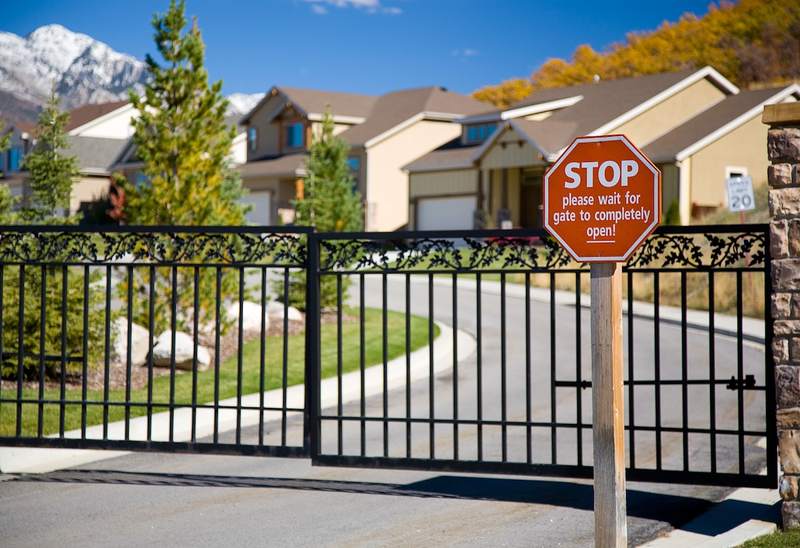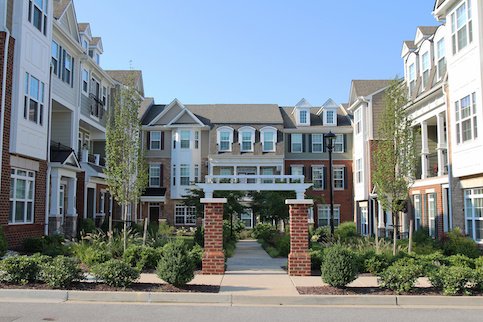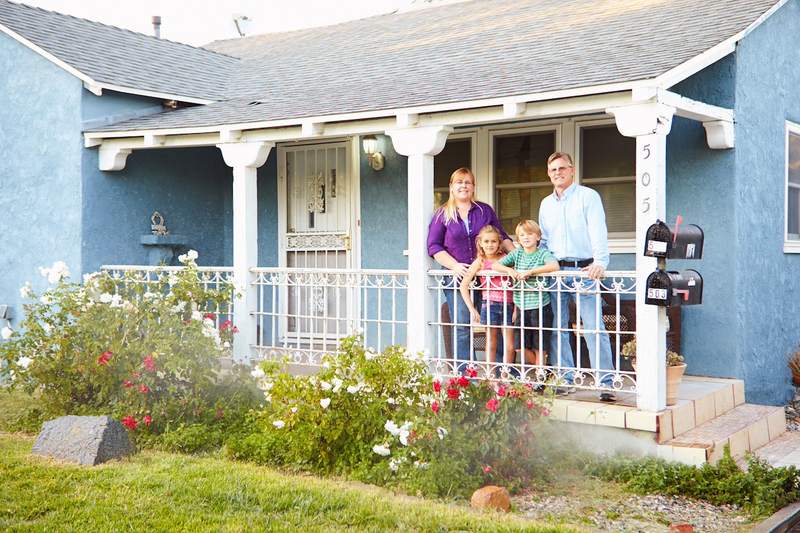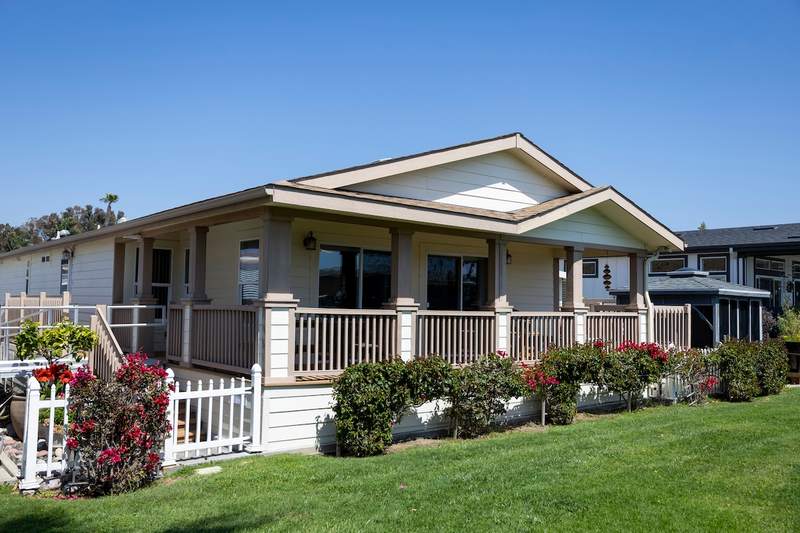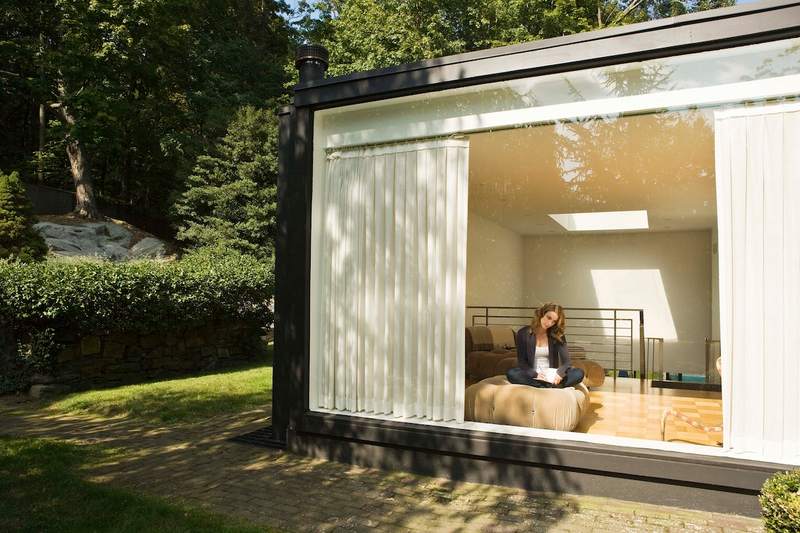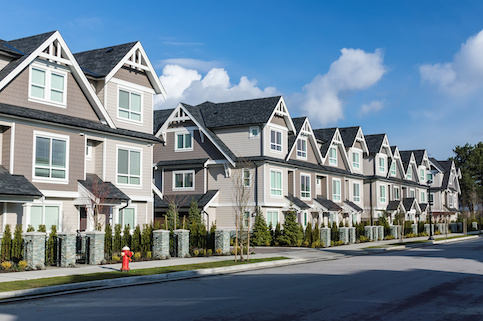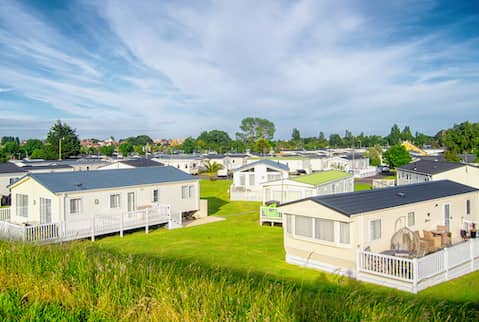Deciding on the right type of home can be tough, especially if you’re a first-time home buyer. And if money is tight, you may be looking for creative ways to get the biggest bang for your buck.
In your search, you may have found townhouses to be an affordable option. But what is a townhouse, and how is it different from other types of houses, like condominiums or detached homes?
Let’s learn more about townhomes, including the pros and cons of owning one.
Key Takeaways:
- Townhouses (or townhomes) can be an affordable option for families who may struggle to afford a larger home but need more space than a condo or an apartment may offer.
- Before buying a townhouse, understand the rules outlined by the homeowners association (HOA) bylaws. Some may not allow pets and others may impose other stipulations that don’t align with the buyer’s lifestyle.
- Individuals also need to consider if they want to rent or buy a townhouse. While renting offers more flexibility, buying a townhome allows homeowners to build equity.
What Is A Townhome?
A townhouse is an individually owned, multifloor home attached to one or more units. You can often spot a townhouse lining the streets in dense suburban and urban areas. Owners are responsible for both the interior and exterior of their townhome.
Townhouses tend to resemble traditional, detached homes but generally operate more like condominiums, or condos, in that they’re all part of a larger governing body. So, if you buy a townhouse, you’re most likely going to be a part of an HOA.
Townhouses are synonymous with rowhouses, though architectural experts may distinguish the latter by the fact that individual rowhouse units share distinct physical characteristics. This isn’t always the case with townhomes. In addition to “rowhouse,” you may also hear builders refer to townhouses as “villas.”
Why Is It Called A Townhouse?
Townhouses originated in England, where the term was introduced to refer to any house that a family owned “in town” while living primarily in the country. With townhomes’ increase in popularity and the decrease of available land in city centers, builders began constructing homes with shared walls, and the modern-day townhouse was born.
Today’s townhomes emphasize vertical space to be economical with square footage in populated areas, so they usually have multiple stories. Although some townhouse developments are built on zero lot lines, townhouses may have outdoor space, like front and back yards.
What’s Your Goal?
Buy A Home
Discover mortgage options that fit your unique financial needs.

Refinance
Refinance your mortgage to have more money for what matters.
Tap Into Equity
Use your home’s equity and unlock cash to achieve your goals.
What Is The Difference Between A Condo And A Townhouse?
Townhouses and condos are different from single-family homes in that they exist in buildings or developments where multiple individual households reside closely together, each in their own unit or home. However, condos and townhomes aren’t the same thing.
Condo vs. Townhouse
Typically, condo owners are responsible only for the interior of their unit and pay HOA fees that cover costs to maintain the outside of the building and any shared common areas. Townhouse communities typically have lower HOA fees than condos because most maintenance falls to individual homeowners. Townhomes also offer more customization freedom than condos, which come with renovation restrictions.
When comparing condos and townhomes, research any HOA rules for units you’re considering. Each HOA is different, and you don’t want to move into a community only to realize it’s much more restrictive than you’d like.
You should also keep in mind that although you may be able to get a lower HOA bill with a townhome, townhomes often cost more than condos because you own more space.
Townhouse vs. Condo vs. Apartment
In the case of both townhouses and condos, each unit is separately owned. In an apartment building, however, one person owns many units and rents them out to occupants. Generally, townhouses and condos are occupied by the owner. But it may be possible for individual units to be rented out by their owners, depending on HOA or condo association rules.
Compared to apartments and condos, townhouses tend to require the most maintenance from individual owners, as you’re responsible for more space.
Townhouse vs. Duplex
A duplex is a single building split into two units, which, like a townhouse, includes a shared wall. Often, one owner owns an entire duplex. The owner might live in one unit and rent out the other, or they may rent out both units.
With a townhouse, each unit is separately owned. Townhouses are structurally different, too. A townhome is typically one of several units in a row sharing one or more walls, while a duplex includes only two units.
Ready To Become A Homeowner?
Get matched with a lender that can help you find the right mortgage.
Should You Buy Or Rent A Townhouse?
Before buying a townhouse, it’s important to consider factors like affordability and flexibility. For example, if you can’t afford a down payment on a townhome, it might be better to rent instead.
Buying A Townhouse
If your income and employment are stable, buying a townhome may be a better option for you because you’d begin to accumulate equity.
If you can buy a home, consider the neighborhood it’s in. An up-and-coming community might promise more equity, which appeals to real estate investors pursuing townhouses as investment properties, although it requires the right lender.
If that’s the route you’re interested in, keep in mind the necessary prep work. You’ll have to establish a budget and evaluate the rental returns, among other measures.
Renting A Townhouse
If you have unsteady pay or employment (or simply don’t have substantial savings), renting a townhome could be easier than getting a mortgage, and it could give you more flexibility.
Renting a townhouse may also be a good fit if you prefer to rent but want or need more space than most apartments offer. Renting a townhouse can also provide access to your own outdoor space, which isn’t necessarily the case with an apartment or condo.
Take The First Step To Buying A Home
Find a lender that will work with your unique financial situation.
Pros And Cons Of Townhouse Living
Townhouse living comes with a unique set of advantages. Townhomes are generally more affordable than detached homes but offer plenty of indoor and outdoor space. But there are downsides too. Townhouse living involves sharing walls with at least one neighbor, and, depending on your HOA agreement, the responsibility of maintaining both the inside and outside of your property.
Here’s a more detailed look at the pros and cons of living in a townhome:
Pros Of Townhomes:
- You can often find a townhouse with monthly costs similar to renting, with the added benefit of building equity on a home you own.
- Since townhouses are usually smaller than detached homes, maintenance tends to be less costly and labor intensive.
- If you can’t afford a detached house just yet, a townhome is a more affordable way for first-time home buyers to get acquainted with homeownership.
- In contrast to a condo, owning a townhouse usually means having your own yard, which can greatly benefit you if you have pets or want a place to care for your own garden.
- You typically get more freedom to make decisions about both the inside and outside of your home with a townhouse than with a condo.
- You may have access to amenities, such as a community pool.
Cons Of Townhomes:
- If you don’t want to be governed by HOA rules, you’ll probably be limited in your search for detached homes (though HOAs can also be common in detached-home neighborhoods, depending on your area).
- Since you share a wall, there’s less privacy with a townhome than a detached home, similar to a duplex.
- Compared to condos or rented apartments, townhomes come with more responsibility in terms of repairs and maintenance.
| Pros Of Townhomes | Cons Of Townhomes |
|---|---|
| Equity: Monthly costs can be similar to renting, but buying a townhome means you can start to build equity. | HOA rules: HOAs can impose rules on the physical appearance of your townhome, what kinds of pets you can have and more. |
| Maintenance: Maintenance is usually more manageable compared to a detached home. | Privacy: Townhomes include at least one shared wall, limiting privacy. |
| Affordability: Townhomes are typically a more affordable option for first-time homebuyers compared to single-family homes. | Repairs: Owning a townhome involves more repairs and maintenance compared to a condo or rented apartment. |
| Outdoor space: Townhomes generally come with a yard or outdoor space. | |
| Autonomy: Townhouse owners get to make decisions about both the interior and exterior of their home. | |
| Amenities: Townhomes may come with community amenities. |
Many of the pros and cons of purchasing a townhome depend on the community you live in, as community amenities, HOA rules, costs and required maintenance can vary greatly. Be sure to shop around and compare communities to find one that fits your wants and needs.
Townhouse FAQ
Below are some frequently asked questions about townhouses.
You’re also responsible for insuring your townhome, though the type of insurance you need will depend on the ownership structure of the community. For example, if your townhome is part of a condo association, you’ll need condo insurance to cover what the association does not. If your townhome isn’t a part of a condo association, you’ll need a full homeowners insurance policy to cover both the interior and exterior of your home.
The Bottom Line
Buying a townhouse can prove beneficial to home buyers because they can build equity without all the responsibilities of caring for the property. Townhomes can offer both space and affordability, making them ideal for first-time homebuyers. But unlike condos, townhomes require owners to maintain both the inside and outside of their property.
As with any major financial decision, research all your house-buying options before making a final choice.

Ben Shapiro
Ben Shapiro is an award-winning financial analyst with nearly a decade of experience working in corporate finance in big banks, small-to-medium-size businesses, and mortgage finance. His expertise includes strategic application of macroeconomic analysis, financial data analysis, financial forecasting and strategic scenario planning. For the past four years, he has focused on the mortgage industry, applying economics to forecasting and strategic decision-making at Quicken Loans. Ben earned a bachelor’s degree in business with a minor in economics from California State University, Northridge, graduating cum laude and with honors. He also served as an officer in an allied military for five years, responsible for the welfare of 300 soldiers and eight direct reports before age 25.


